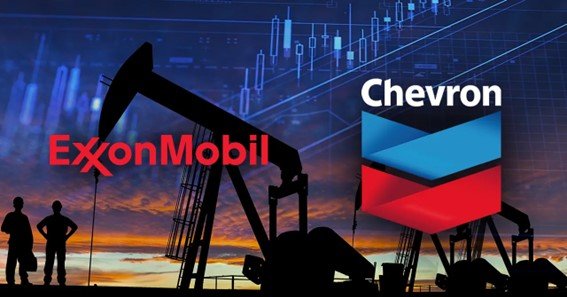When comparing ExxonMobil and Chevron, two of the largest U.S.-based oil and gas companies, both present solid opportunities for investors. However, they differ in terms of financial metrics, dividend payouts, and growth strategies, making one potentially more appealing based on individual investor goals.
Key Comparisons
- Market Capitalization & Financial Stability ExxonMobil holds a larger market capitalization of around $458 billion compared to Chevron’s $294 billion. Both companies have strong balance sheets and consistent cash flows, with ExxonMobil currently leading in terms of free cash flow and dividend consistency. Chevron, however, faces short-term hurdles due to its recent acquisition of Hess Corporation, which has introduced potential risks but could also provide long-term growth.
- Dividends Both companies are known for their strong dividend policies. ExxonMobil has a slightly lower dividend yield at around 3.4%, compared to Chevron’s higher yield of about 4.8%. However, ExxonMobil’s long history of increasing dividends (41 consecutive years) gives it an edge in terms of dividend growth stability.
- Growth Strategies ExxonMobil has been focusing on acquisitions and expanding its operations in key areas like the Permian Basin and Guyana, along with investing heavily in low-carbon technologies. On the other hand, Chevron is also diversifying into renewables but faces challenges in some of its overseas projects, including costly infrastructure replacements in Kazakhstan.
- Valuation & Stock Performance Chevron is currently trading at a lower valuation (P/E ratio of 12.8) compared to ExxonMobil (P/E ratio of 13.6), making it relatively undervalued. Analysts see potential for greater upside in Chevron’s stock, with estimates suggesting a 30% price increase, compared to ExxonMobil’s 20%.
Which is Better for Investors?
- ExxonMobil may be more appealing for investors looking for consistent dividend growth, a strong free cash flow position, and long-term stability.
- Chevron could be a better choice for value-oriented investors seeking higher dividend yields and the potential for stock price appreciation, particularly after overcoming short-term challenges.
FAQ
- Which company offers better dividends, ExxonMobil or Chevron? Chevron offers a higher dividend yield (4.8%) compared to ExxonMobil (3.4%), though both are strong in dividend growth.
- Is ExxonMobil or Chevron better for long-term growth? ExxonMobil’s focus on expanding in high-growth regions like Guyana and its low-carbon initiatives make it more attractive for long-term growth.
- Which company is more undervalued? Chevron is currently trading at a slightly lower valuation, with analysts expecting a greater upside potential in its stock price.
- How do ExxonMobil and Chevron compare in terms of financial stability? Both companies have solid financials, though ExxonMobil holds a larger market cap and free cash flow, giving it an edge in financial stability.
- What are the risks for Chevron investors? Chevron faces short-term risks, including cost overruns in projects like Kazakhstan, but these are mitigated by its diversified portfolio and recent acquisitions.
